Two days ago, Iranian President Ebrahim Raisi perished in a helicopter accident over the Dizmar forrest in Iran. Raisi had been the eighth leader of the country of Iran as it is presently constituted, post-Revolution of 1979, being elected to the position in 2021. Prior to that, he was the Chief of Justice in Iran. Of all the titles Raisi had throughout his life, one sticks out the most: The Butcher of Tehran.
As the New York Post puts it, it’s a very good thing that Ebrahim Raisi is now dead, as his role prior to becoming Iran’s president was a brutal one. He served as head of the judiciary department for a decade. What followed was his appointment as prosecutor general in 2014. In the years that would follow, some of his past atrocities would come back and haunt him. The United States would hand down sanctions on Raisi due to his role in human rights violations that date back to the 1980s.
Raisi has an enormous amount of blood on his hands due to his role as Chief Executioner during the mass execution of political prisoners in 1988. The reason behind this massive bloodbath is that the Supreme Leader, Ayatollah Ruhollah Khomeini, issued a fatwa once the war with Iraq was coming to an end. The Ayatollah had a Tehran Death Committee formed with Raisi at the head of the table of sorts, as he and the committee would execute those who opposed them and any who were “waging a war on God.” There was a reported second fatwa where those who were executed were those with leftist agendas and of the Communist party. The estimated number of those executed in July of 1988 was estimated to be anywhere between 4,000 to 30,000 people.
However, Iranian government officials have always given mixed numbers on the death toll. President Akbar Hashemi Rafsanjani has stated that the number is closer to 1,000. Many leaders in Iran have also never denied the Tehran Death Committee, especially Raisi. Whom believes it was an act to fight off extremists within their country. When elected in 2021, Raisi stated publicly to reporters that, “If a judge or prosecutor has defended the security of the people, he should be praised.”
Raisi’s first presidential run in 2017 was jeopardized due to the executions in 1988. In an audio file that was released that dates back to the time of the executions, Raisi states on it that “if it were another group, the death toll would have been higher in Tehran.” Up until these audio files were released, his role in the executions was not clearly documented in the records of the process and, for awhile, seemed overlooked.
The 1988 massacre changed politics in Iran going forward, having many political figures speak out against the actions when they happened and still to this day. Not one leader of the Death Committee was ever held accountable in front of a court of law. All other members of the committee moved up to high-ranking government officials, but it was Raisi who climbed to the highest seat in Iran. Raisi’s death is just another factor that now plays into the conflicts overseas, as Iran is a country that has attacked Israel, and financially backed the Palestinian militant group Hamas for many years.
